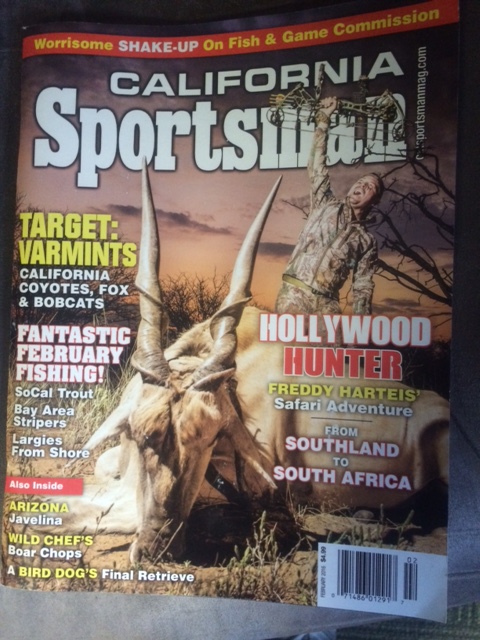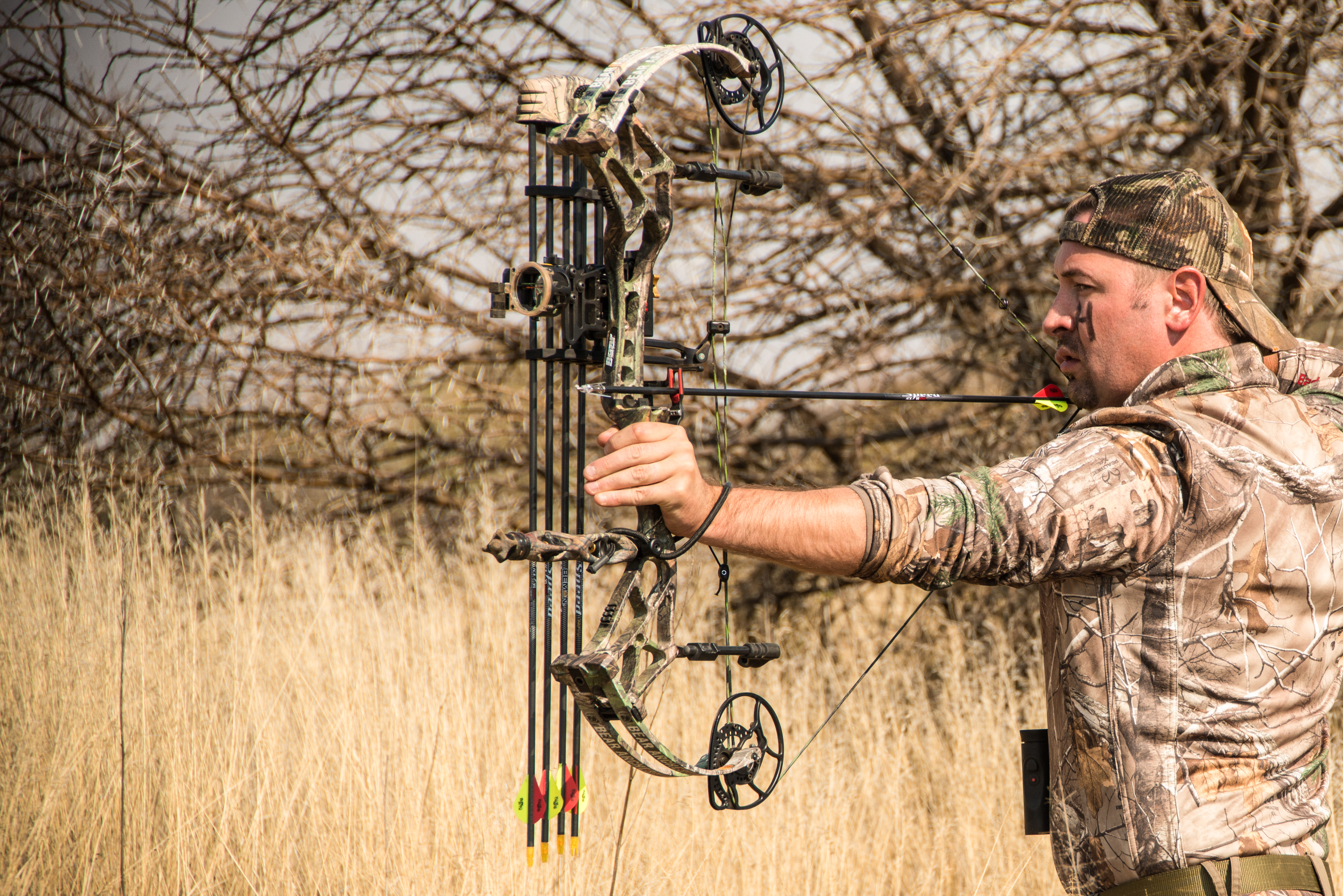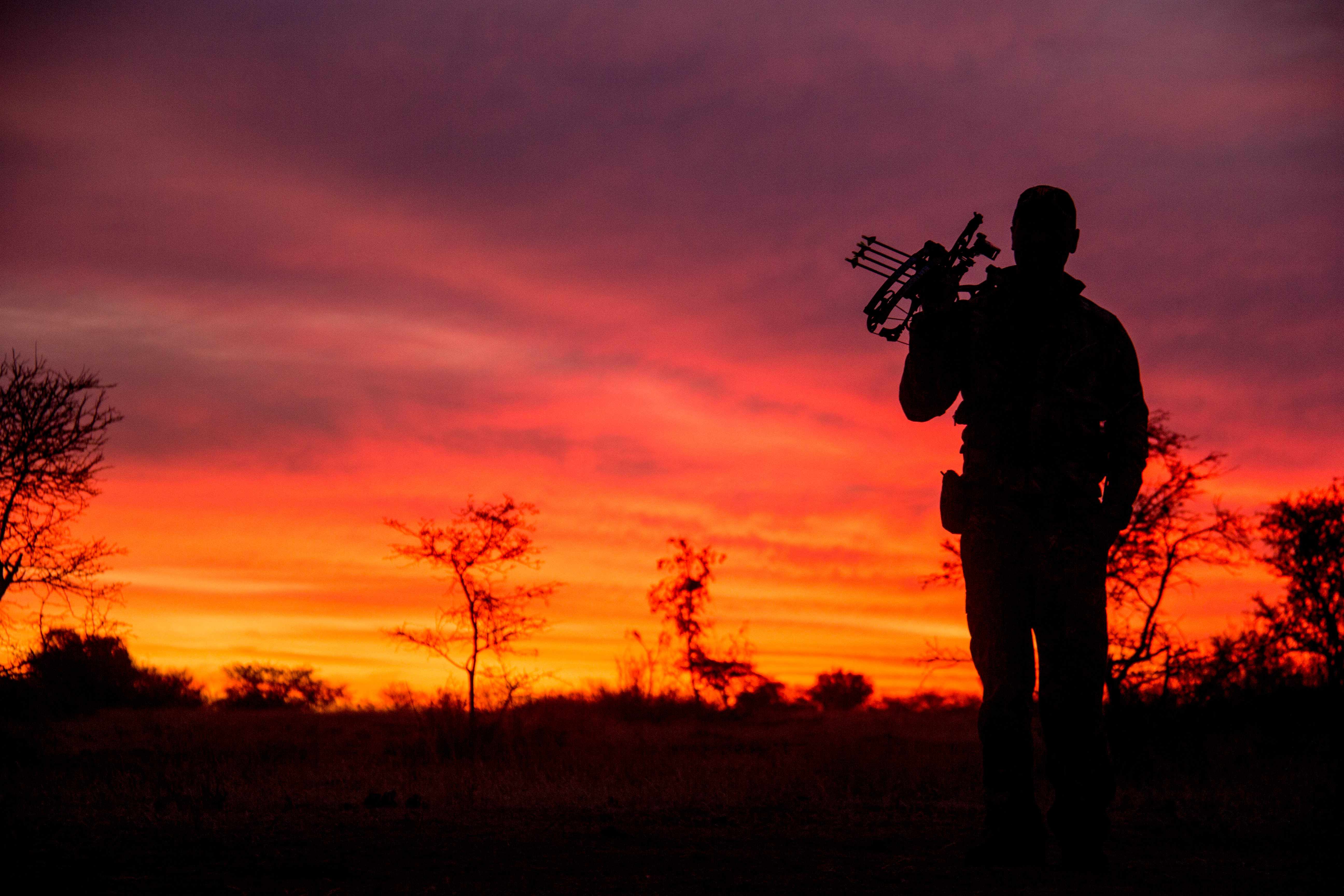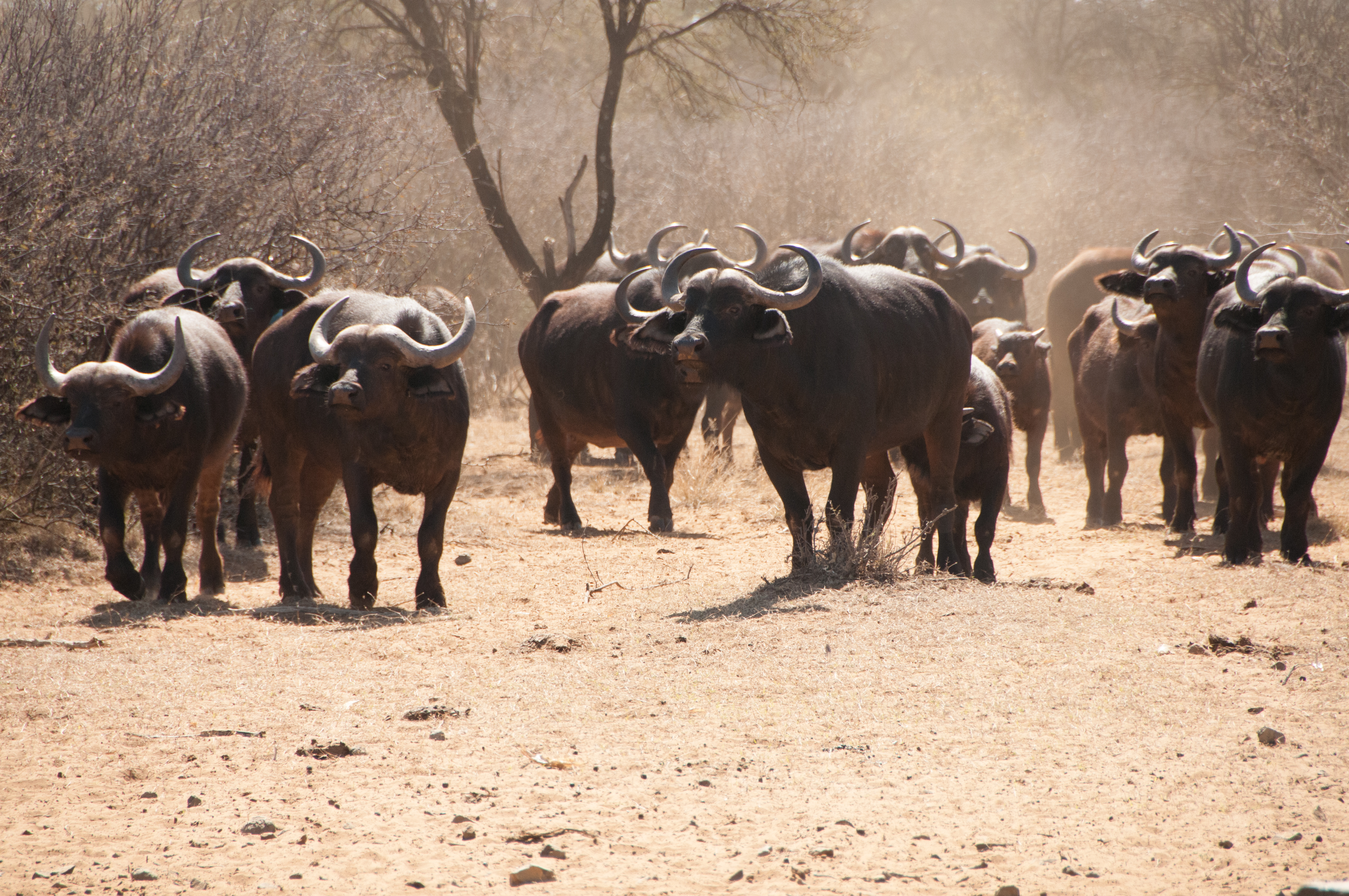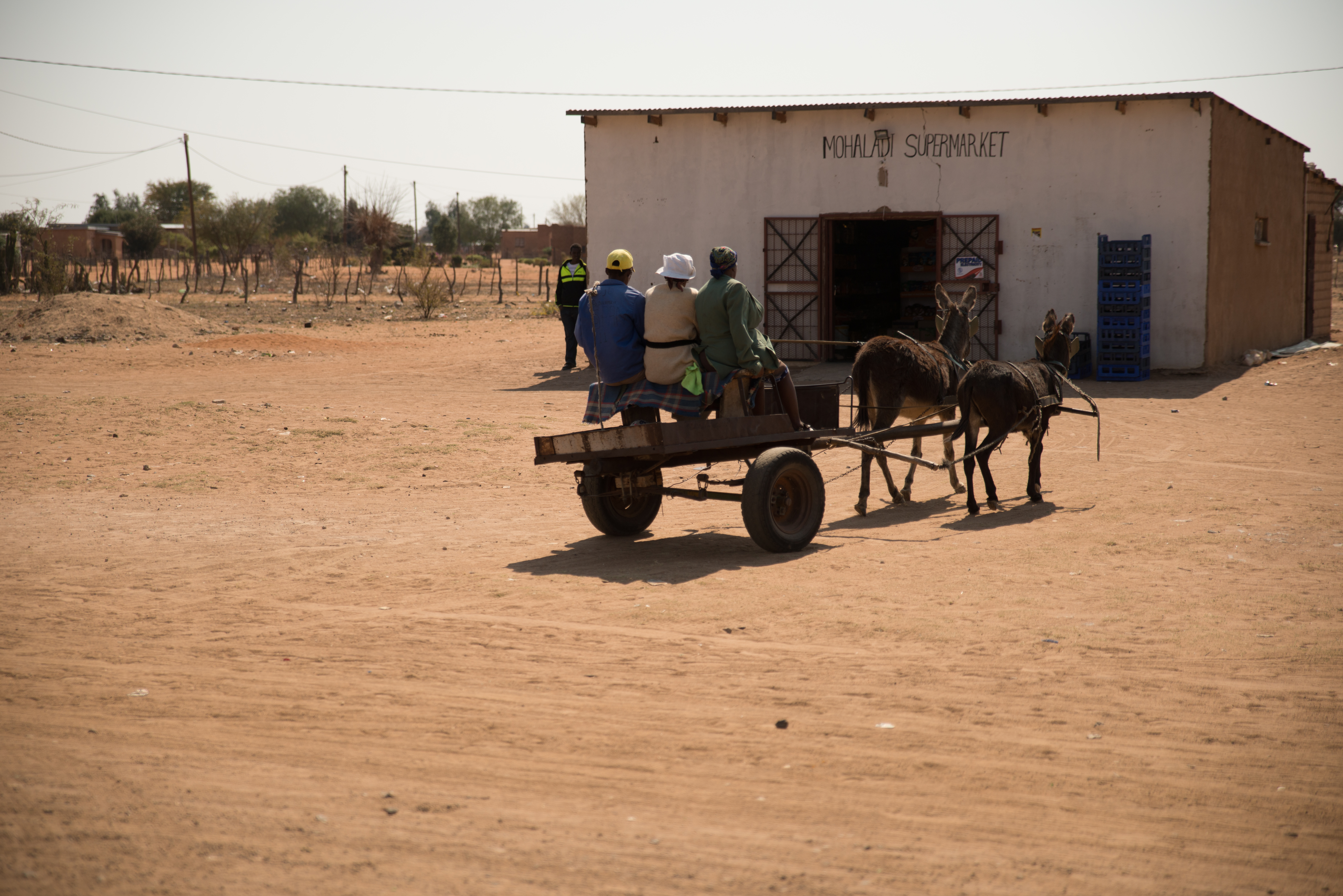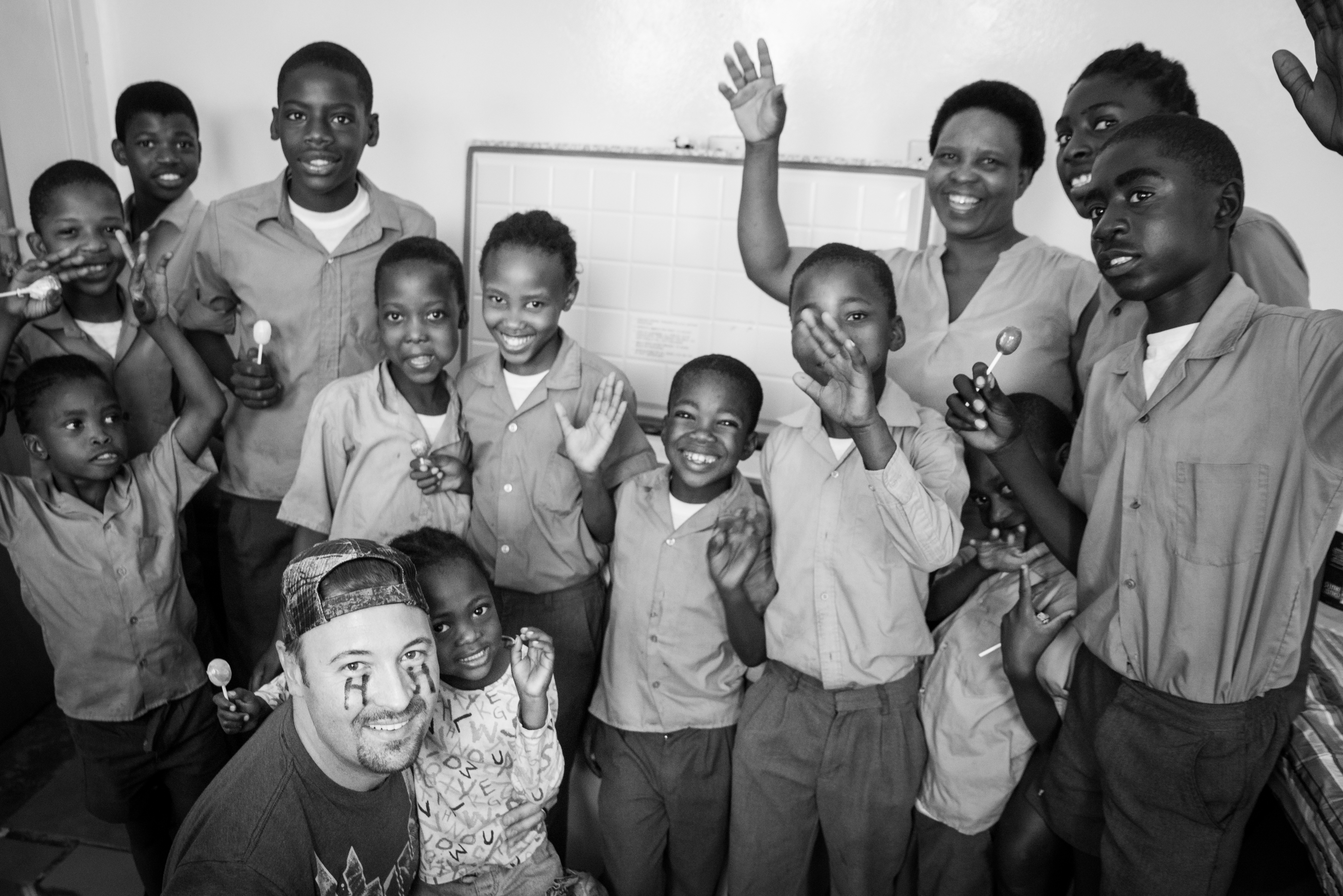Hollywood Hunter’s African Adventure
The following appears in the February issue of California Sportsman:
Photos by Clint Easley/Peak Photography
By Chris Cocoles
On three African safaris, like most hunters who travel there, Freddy Harteis has harvested a lot of animals.
But the man known as the Hollywood Hunter – he was born in Pennsylvania but lives in Los Angeles with his TV talk show host wife, Jeannie Mai – can write a screenplay about what he’s witnessed when not tracking springbok, gemsbuck and nyala.
Consider that Harteis’ Hollywood Hunter Sportsman Channel series (he also appeared on the December 2014 cover ofCalifornia Sportsman) has taken him all around North America and beyond during the show’s five-plus-year run. But there’s been something special about his trips to Zimbabwe – when he hunted with his late father, Fred – and his latest adventure in South Africa.
“To me, it’s not so much about the kill or the harvest,” says Harteis, who on his multiple pilgrimages to the African continent has gotten something different out of each hunt.
When he went with his dad in 2000 celebrating the son’s college graduation, Harteis was unsure of the totally different world he was about to step into. He calls it a humbling experience (about the only downer was he fell ill with symptoms of bubonic plague and malaria on the flight home). The memories of that family vacation tugged at him two years ago when he joined his close friend, Matt Lingle, and his 9-year-old son, Elliott.
“I learned how valuable it is to create lifetime memories with a father and son,” Harteis says. “I couldn’t help but reflect from the time when my father took me because I had lost him three years ago. The trip was around the anniversary of his death.”
He and Lingle returned last year with the intention of hunting an African lion, but they had to cancel those plans (see sidebar). While the itinerart shifted to plains game, the cultural experience of engaging with the locals had a far bigger impact than he could ever imagine.
“A lot of times when we go on an adventure, other good things come out of it,” he says. “And to me, that’s just so fulfilling to see something come out of it. You take a trip halfway around the world and get the experience of something you’ve never seen before.”
THIS WAS ONE of those moments when the reality that Harteis had entered a rather unique ecosystem rang true. And it was on the first full day of the trip! After arriving in Johannesburg, Harteis and Lingle were picked up for a four-hour trip to the lodge, then quickly headed out into the field to check out the surroundings with the professional hunters from Frikke Du Toit Safaris (africabig5.co.za).
“We decided we were going to hit the ground running,” Harteis says.
But the ground was about to rumble.
“We drove up on about 100 buffalo and they didn’t want to leave. The (professional hunter) had just put up a ground blind that they had destroyed. We walked up to the blind that was stomped to pieces. We had bows and arrows in hand,” Harteis says.
“And my executive producer is sitting in the back of the blind – he’s a total city guy from Los Angeles – and he’s freaking out and saying, ‘OK, they’re not really afraid of us, and all we have is a bow and arrow.’”
But this is why sportsmen and -women from all over the world flock to this corner of the globe – even “city folk” from L.A. In this world, an angry and potentially dangerous herd of Cape buffalo makes you feel the kind of thrill ride that’s equal parts terror and begging for more.
In this case, “more” turned out to be the appearance of a large gemsbuck. And after three days of setting up and moving blinds to get in the right position in regards to the wind, the gemsbuck they’d seen on that first day was spotted again, but it wasn’t going to be easy.
“There were about 40 of them together and they were not the easiest to get into bow range. All bets were off with everything else,” says Harteis, who despite the difficulty was undaunted. “No matter what came in, we were not screwing this up.”
Sure enough, with some patience the animal in question got within a good bow shot at 40 yards and Harteis connected.
“That was kind of the kickoff of what I looked at as my greatest African experience,” he says.
ABOUT THE ONLY other destination Harteis has hunted that he can compare to Africa is New Zealand, another far-flung locale with species you may not find anywhere else in the world, at least back home in North America.
“But I haven’t been anywhere in the world that could really compete with the adventure and the thrill of going out day in and day out,” Harteis says, “and every day (being) a new experience as Africa gives you.”
“I think what’s so unique is, the animals move only when it’s warm. And everywhere else in the world I’ve hunted, they only move when it’s cool – mornings and evenings. But these animals don’t start moving until late morning or midday when it warms up. So that to me is interesting.”
Harteis suggests that hunters dreaming of a safari in South Africa or neighboring nations like Zimbabwe and Namibia should experience both a rifle and bow hunt. But the Hollywood Hunter’s first love is archery, and he was happy to take on the challenge of hunting with his bow.
The tricky variable is how skittish and constantly on the move African game is with so many different predators that share the real estate.
“I was hunting springbok and we had one at about 55 yards; he had no idea we were there. He was facing the other direction broadside. I took my adjustable sight and put it at 50 yards, even though he was at 55,” he says.
“And he had no idea (the springbok) was there; I drew the bow and shot and I gave him 5 yards. So my arrow was dropping below him. As I watched him still turn his head, look in our direction, here came the arrow. And he ducks right into my arrow. If I would have shot that animal at 55 yards instead of 50 – even though he was at that range – I would have shot right over his back.”
That slight adjustment can make all the difference in the world between a successful shot and a demoralizing miss. Harteis is an accomplished hunter back home, but he marvels at the PHs and trackers he’s joined on these African adventures and who were so vital to the hunt.
“You never try to guide the professional. You realize no matter what the terrain is, where you are or what you’re familiar with, you’re never better than the guy who lives there and you’re letting him lead you to success,” he says.
“One thing I love about hunting, too, in going to different areas is there’s such a learning curve; there are so many things that we do learn every time we’re out there that we would have never known if we stayed where we typically hunt.”
CHANCES ARE, IF you go to Africa to hunt plains game, your guides are likely to harvest some of the species you’re targeting. But respect is due to the wildlife that endures in spite of the sweltering conditions and the abundance of predators that share terrain. And in the animals vs. hunter game, the former can come out on top even with the most skilled archers and wily PHs.
The previous year, Harteis, Lingle and Lingle’s son, Elliott, all tried to harvest a wildebeest. Can you guess who among the three got a successful shot in?
“(Elliott) center-punched a wildebeest, and that was just awesome. I fumbled through a shot and neither one of us got one,” Harteis says of himself and Elliott’s dad. “We were both walking in for revenge because we had a 9-year-old telling us how much better he is at hunting than us. It was unbelievable. He said, ‘I’m the next Hollywood Hunter. I’ll teach you how to shoot a wildebeest.’”
The next year, Harteis did get a wildebeest but the elder Lingle again couldn’t find the range, giving his kin another opportunity to rub it in upon their return to the U.S. But that’s OK. Over the course of the trip, both hunters managed to take multiple species of plains game. And they would be around plenty of locals in need who could make good use of the harvest.
Harteis’ Southern California home base is in the center square of the antihunting community (Mai co-hosts the syndicated show, The Real, and the couple has befriended many who don’t agree with his passion). But Harteis has won over a lot of his detractors by distributing meat from North American-harvested elk and other species to the homeless of L.A.’s infamous Skid Row and impoverished families in the Southland.
The experience would trigger both despair and hope.
HARTEIS WITNESSED MYRIAD scenes of plight and struggle as he traveled throughout South Africa, but he was also blown away by the resolve of those he interacted with. Greetings with a smile became commonplace.
“They have huts that don’t even have walls – just a straw roof – and they lie there out in the open. And you just see a whole different type of lifestyle. There are other areas where people are starving,” Harteis says.
“They understand work ethic at a different level than what we do. They live every day to survive and they do what they have to. We have the luxury of building a lifestyle and they have the sustainability just to live. I admire them that they get through what they get through because it’s so difficult.”
One of the stops The Hollywood Hunter crew made was to an orphanage in Pomfret, an isolated village in the northwest of South Africa near the border with Botswana on the site of an old asbestos mine. It was a dreary place, home to many former Angolans who fought for South Africa in a series of border wars from the 1960s to 1980s.
But the orphanage has given young residents hope, and Harteis and his party delivered needed supplies and candy for the kids. They also brought meat from some of the harvested animals to feed everyone.
“We spent the day with them; they could speak English to a degree and we would hear them tell their stories – where they go to school and what their goals are as they grow up. It was (great) to interact with them and to see them so excited about the little things,” Harteis says.
“It made me sit there and realize how spoiled I am because they take the simple things and cherish them, as (small) as a lollipop. To me that was one of the highlights, to see the good come out of the hunt and to be able to meet these kids in this village.”
They also met the students at the nearby school and addressed each of the kids, ranging from grades 1 to 12.
“They put us in an auditorium and we talked about why we went to Africa and why we were excited to be there with them and talk to them about their goals and how and why I became the Hollywood Hunter,” he says.
“We all have things that are instilled in us to go out and become who we are. That’s what drives and motivates us. I had some of the most awesome conversations with these kids.”
Hunters are going to be criticized regardless of their intentions, motives and charitable endeavors that become the end game of what they do. Harteis certainly wants to return to Africa for another safari in the future and expects to meet more new friends and get a brief but lasting introduction into their world.
“You’re humbled that much more seeing people live at that level, and the fact that we can help by doing little things in being over there,” Harteis says. CS
Editor’s note: For more on the show, go to hollywoodhunter.tv. Follow Freddy Harteis on Twitter (@FreddyHarteis) and Instagram (@thehollywoodhunter) and like at facebook.com/HollywoodHunter1/
Sidebar
THE TRUTH ABOUT LION HUNTING
Editor’s note: Freddy Harteis had planned to hunt lions in South Africa’s Kalahari Desert, but just after the shooting of a well-known lion by an American hunter last summer, the swirling controversy caused the hunt to be canceled. Harteis did learn a lot about the facts and fiction of lion hunting in Africa and shared the following thoughts:
I had flown over there with my executive producer and two cameramen to document this lion hunt, because this (controversy) was starting to heat up. And I thought this would be a good time to educate all the hunters out there who are wondering, “Is this something that we should be doing or shouldn’t be doing? What are really the facts?”
So as I planned with Frikke Du Toit Safaris (africabig5.co.za), Frikke himself assured me everything would go as planned. We had all the right permits and he was looking to bring in some other officials. I had sent my executive producer for three days to learn about lion hunting in South Africa: Go meet up with different concessions; talk to some of the people who are really not for the hunting but had raised lions in the past. I wanted to get a good grip on what lion hunting was all about.
In the process of this we started collecting more and more data. And I started realizing that just like people do when they go to Africa, the only reason why animals do thrive over there is because there are a number of catch-fee animals. And what I mean by that is, for example, a gemsbuck might be $2,500 and a sable might be $10,000; a lion would be anywhere from $30,000 to $60,000.
And when you start looking at the fact that every animal has a number attached to it, you look at (antihunters) and the people who just don’t understand the big picture. They call what we do either canned hunts or fenced hunts, or hunts that are on big concessions where we may go out and kill a lion that’s free-range or maybe along the borders of a park. That is hunting ground and it is legal, and they have to regulate and monitor animals in that area. That’s the only way in which they do so.
So as we started collecting more and more info, I started realizing that, OK, when it comes to lion hunting, there are several thousand more lions in South Africa alone today than there have been anytime in the past. And the reason for that are some of these breeding programs, which some call “canned hunts,” are really ways in which we can have lions and big tracts of land fenced in so they aren’t killing other humans and killing off the livestock and the other wild animals around them.
So now, on these big tracts of land, these lions can actually thrive there and be supported there and taken care of, as well as be hunted. And the numbers in South Africa have thrived.
In Botswana, whenever they decided to ban lion hunting, now we’re at a place where there’s no value attached to that lion. When there’s no value to a lion, what is the purpose of us keeping that lion around? Because when he’s killing off all these other animals that have value attached to them, now we’re sitting in a place where there are more people shoveling those lions in the ground and keeping it quiet. That’s how we realized in some other countries they go extinct.
So the lions in the parks are – and what most people don’t realize – being affected by the buffaloes because they are carrying diseases and killing lions. So when the lion is killing off the buffalo, it’s killing off the lions in these parks. So they’re still trying to figure out how to solve that problem. But in the process, as hunters and conservationists and landowners in Africa have decided to keep the lion thriving, it is these big concessions and these big tracts of land that give the ability of the lions to not go extinct. When it comes to the $30,000 or whatever this hunter would come in to hunt that lion, we’re looking at that money going into so many different resources in Africa that really helps sustain that animal.
To be able to go out there and hunt this lion literally affects dozens and dozens of families and hundreds of people per hunt. This is their only way of means. In most of these African countries, the population of which works versus the unemployed is just astronomical. Like 20 percent of the population in Zimbabwe works, and now they’re trying to pull away lion hunting, which is now a big part of the economy to help the people.
So I’m seeing all this unfold, with (those who speak Afrikaans) getting stirred up and angry about the fact that they might lose their careers and their means to be able to feed their families. I even heard one of them say, “Damn the Americans,” for not understanding the facts of what’s happening here. CS

